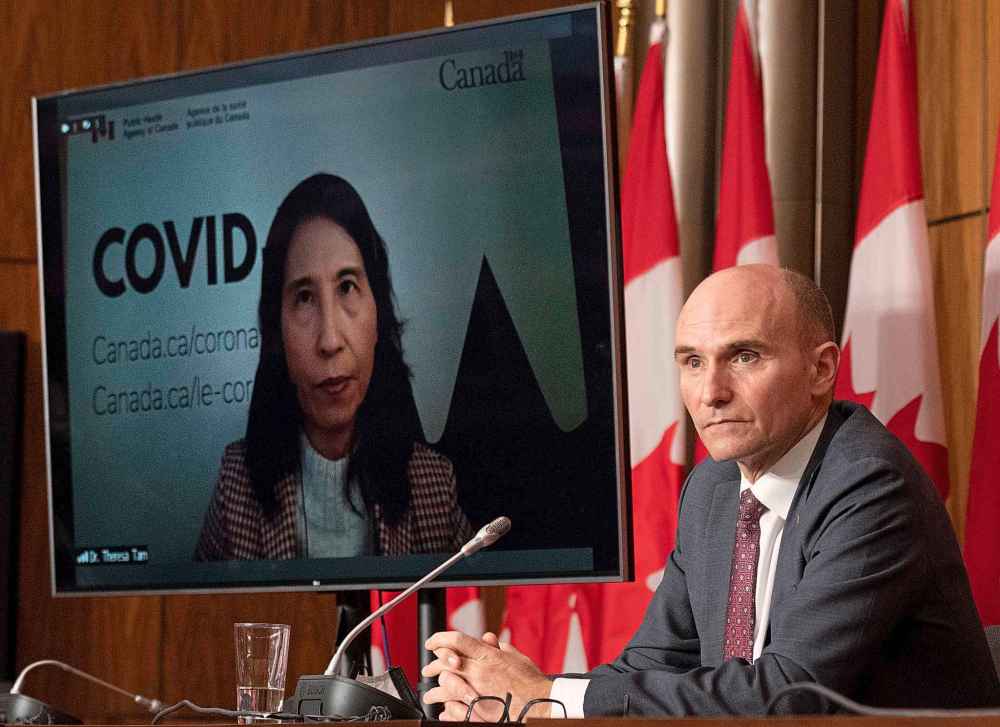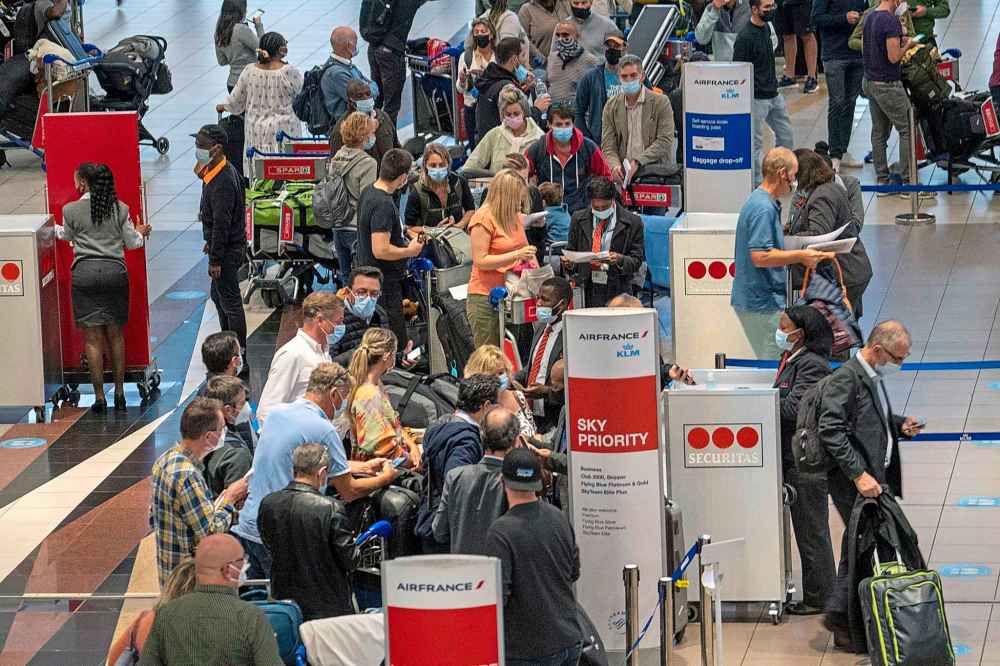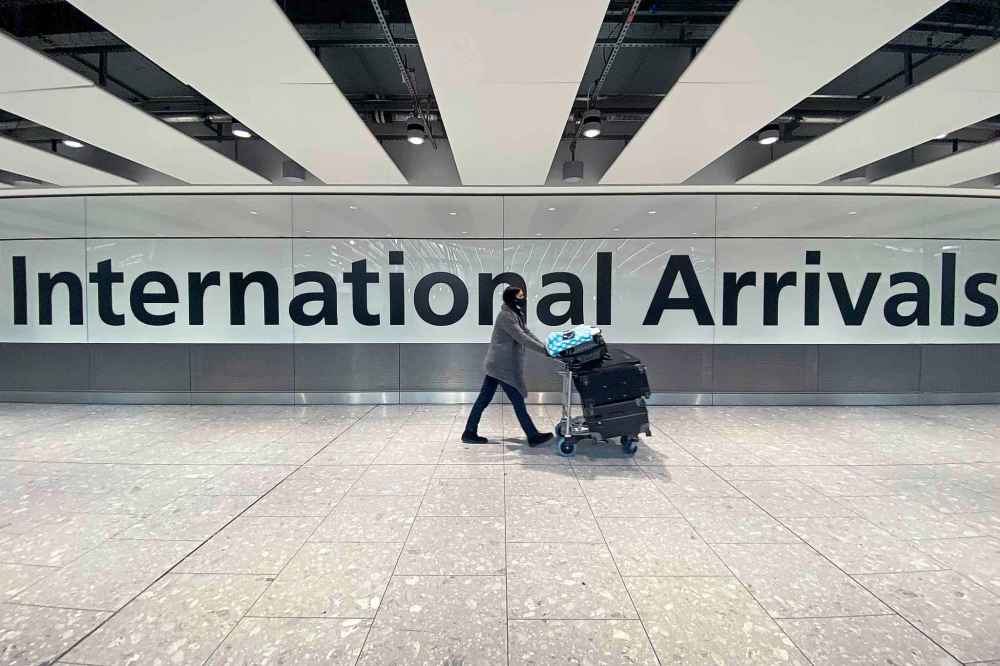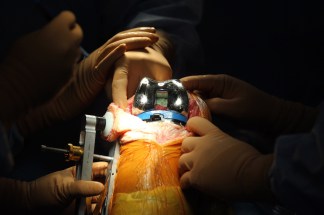New ‘Omicron’ variant prompts Canada to ban visitors from southern Africa
Read this article for free:
or
Already have an account? Log in here »
To continue reading, please subscribe:
Monthly Digital Subscription
$0 for the first 4 weeks*
- Enjoy unlimited reading on winnipegfreepress.com
- Read the E-Edition, our digital replica newspaper
- Access News Break, our award-winning app
- Play interactive puzzles
*No charge for 4 weeks then price increases to the regular rate of $19.00 plus GST every four weeks. Offer available to new and qualified returning subscribers only. Cancel any time.
Monthly Digital Subscription
$4.75/week*
- Enjoy unlimited reading on winnipegfreepress.com
- Read the E-Edition, our digital replica newspaper
- Access News Break, our award-winning app
- Play interactive puzzles
*Billed as $19 plus GST every four weeks. Cancel any time.
To continue reading, please subscribe:
Add Free Press access to your Brandon Sun subscription for only an additional
$1 for the first 4 weeks*
*Your next subscription payment will increase by $1.00 and you will be charged $16.99 plus GST for four weeks. After four weeks, your payment will increase to $23.99 plus GST every four weeks.
Read unlimited articles for free today:
or
Already have an account? Log in here »
Hey there, time traveller!
This article was published 26/11/2021 (1477 days ago), so information in it may no longer be current.
OTTAWA – Canada is closing its borders to visitors from southern Africa after the discovery of a concerning new COVID-19 variant was detected in the region.
The new variant, dubbed Omicron, first emerged in South Africa and coincided with a steep rise in the number of COVID-19 cases in that region in recent weeks, according to the World Health Organization.
“We are therefore acting quickly in order to protect the health and safety of Canadians,” said Health Minister Jean-Yves Duclos at a news conference Friday.

So far there have been no cases detected in Canada.
The ban will apply to foreign nationals who transited through a list of seven countries in the last 14 days, including South Africa, Mozambique, Botswana, Zimbabwe, Lesotho, Namibia and eSwatini.
Those already in Canada who recently travelled through the region will need to quarantine, and be tested for COVID-19.
Global Affairs is also issuing an advisory to discourage non-essential travel to South Africa and neighbouring countries.
Canadian citizens and permanent residents arriving home from the region must get a COVID-19 test before they return, and will need to quarantine at a designated hotel until their entry test proves negative.
After that they will be able to isolate at home until they test negative 10 days after arrival.
Currently there are no direct flights from southern Africa to Canada.
Travellers from elsewhere will need to comply with existing COVID-19 prevention measures to enter Canada, including presenting a negative molecular COVID-19 test, even if they are vaccinated.

“We know very little about this variant right now,” Canada’s chief public health officer, Dr. Theresa Tam, said at a briefing Friday.
The mutations that have been detected show the potential for greater transmissibility, she said, and could reduce natural immunity and even the immunity offered by vaccines.
“We are concerned about this new variant and closely monitoring the evolving situation,” she said.
Tam said she would not be surprised to see cases start to crop up in Canada, and Transportation Minister Omar Alghabra said the government will take additional border measures if necessary.
“This variant has a large number of mutations, some of which are concerning,” the WHO wrote in a statement Friday.
“Preliminary evidence suggests an increased risk of reinfection with this variant, as compared to other (variants of concern.)”
Researchers are already working to learn more about the effects of this new variant, according to WHO’s COVID-19 technical lead Dr. Maria Van Kerkhove.

“Researchers are getting together to understand where these mutations are, and what that potentially may mean for our diagnostics or therapeutics in our vaccines,” she said at a briefing Thursday.
The WHO has urged countries to enhance surveillance for variants and report any initial cases.
Cases of the Omicron variant have been seen in countries outside of southern Africa, including Hong Kong, but so far Dr. Tam said there is no community spread in those areas.
Several countries have taken similar actions to Canada, closing their borders to foreign nationals who have recently been in southern Africa, which could make it difficult for Canadians to find their way home.
Alghabra urged any Canadians in that situation to reach out to Global Affairs.
Opposition parties and provincial premiers have called for strict border measures to prevent cases of the potentially dangerous new variant from being imported into Canada.
Conservative Leader Erin O’Toole had called on the Canadian government to issue travel advisories, banning non-essential travel to and from the region earlier Friday morning.

“With reports of the spread of a new COVID-19 variant, we have a small window of opportunity to act, and we must move now,” O’Toole said in a statement.
The party was critical when the government delayed closing Canada’s borders at the outset of the pandemic in 2020.
The premiers of Alberta, Ontario and Quebec also called for all travellers originating from those countries to be banned from Canada until more is known about the variant.
This report by The Canadian Press was first published Nov. 26, 2021.
Manitoba reacts
A statement from the province on the new omicron variant:
The province continues to monitor the situation and work with federal officials in the fight against COVID-19 and its variants. At this time, measures such as travel restrictions would be a federal decision.
No cases of the B.1.1.529 omicron variant have been detected in Manitoba at this time and the province can confirm that all positive travel-related specimens are being sequenced.
In the meantime the province urges Manitobans to follow the public health orders, focus on the fundamentals and get vaccinated. Vaccine still provides one of the best defences against COVID-19.
What we know about the omicron variant
Why are scientists worried?
It appears to have a high number of mutations — about 30 — in the coronavirus’ spike protein, which could affect how easily it spreads to people.
Sharon Peacock, who has led genetic sequencing of COVID-19 in Britain at the University of Cambridge, said the data so far suggest the new variant has mutations “consistent with enhanced transmissibility,” but said that “the significance of many of the mutations is still not known.”
Lawrence Young, a virologist at the University of Warwick, described the variant as “the most heavily mutated version of the virus we have seen.” He said it was concerning that although the variant was only being detected in low levels in parts of South Africa, “it looks like it’s spreading rapidly.”
Dr. Anthony Fauci, the U.S.’ top infectious diseases doctor, said American officials had arranged a call with their South African counterparts later on Friday to find out more details and said there was no indication the variant had yet arrived in the U.S.
What’s known and not known about the variant?
Scientists know that the new variant is genetically distinct from previous variants including the beta and delta variants, but do not know if these genetic changes make it any more transmissible or dangerous. So far, there is no indication the variant causes more severe disease.
It will likely take weeks to sort out if the new variant is more infectious and if vaccines are still effective against it.
Even though some of the genetic changes in the new variant appear worrying, it’s still unclear if they will pose a public health threat. Some previous variants, like the beta variant, initially alarmed scientists but didn’t end up spreading very far.
“We don’t know if this new variant could get a toehold in regions where delta is,” said Peacock of the University of Cambridge. “The jury is out on how well this variant will do where there are other variants circulating.” To date, delta is by far the most predominant form of COVID-19, accounting for more than 99% of sequences submitted to the world’s biggest public database.
Which countries have cases?
It’s unclear exactly where the new variant originated. It was first detected in South Africa, and then later identified in Belgium, Botswana, Hong Kong and Israel.
How did this new variant arise?
The coronavirus mutates as it spreads and many new variants, including those with worrying genetic changes, often just die out. Scientists monitor COVID-19 sequences for mutations that could make the disease more transmissible or deadly, but they cannot determine that simply by looking at the virus.
Peacock said the variant “may have evolved in someone who was infected but could then not clear the virus, giving the virus the chance to genetically evolve,” in a scenario similar to how experts think the alpha variant — which was first identified in England — also emerged, by mutating in an immune-compromised person.
What is Canada doing?
Canada is moving to ban entry of foreign nationals into Canada who have travelled through southern Africa in the last 14 days. The ban impacts seven different countries in Southern Africa including Botswana, Eswatini, Lesotho, Mozambique, Namibia, South Africa and Zimbabwe.
Anyone who recently arrived in Canada from the region in the last 14 days must quarantine immediately, take a COVID test and remain quarantined until they get a negative test result. To implement this, the federal government will be working with provinces and territories.
Canadians, permanent residents and those with right of entry into Canada will be tested upon arrival. They will quarantine until they get a negative test, only then will they be allowed to quarantine elsewhere in a safe and appropriate manner. They are then tested again on the 8th day until they complete their quarantine period.
The federal government is issuing a travel advisory asking all Canadians not to travel to Southern Africa for the time being.
Lastly, Canadians who return from that region and need to transit through another country will have to take a test in that transit country and remain there until they test negative before being allowed to return home. The government adds that there are currently no direct flights from Southern Africa.
Are travel restrictions justified?
Given the recent rapid rise in COVID-19 in South Africa, restricting travel from the region is “prudent” and would buy authorities more time, said Neil Ferguson, an infectious diseases expert at Imperial College London.
Jeffrey Barrett, director of COVID-19 Genetics at the Wellcome Sanger Institute, thought that the early detection of the new variant could mean restrictions taken now would have a bigger impact than when the delta variant first emerged
“With delta, it took many, many weeks into India’s terrible wave before it became clear what was going on and delta had already seeded itself in many places in the world and it was too late to do anything about it,” he said. “We may be at an earlier point with this new variant so there may still be time to do something about it.”
In a news conference Friday, South African officials called the swift travel bans “unjustified” and wanted to reassure South Africans and the global community at large that the data is still new and being evaluated by medical experts.
“This uncertainty is creating panic and unfortunately resulting in many countries taking precautionary, temporary steps by banning travel to South Africa and our region. This is a blow to our economy and will be felt most in our province, as our tourism and hospitality sector is highly reliant on international travellers over this peak season to sustain itself and create jobs,” South Africa’s Premier Alan Winde said in a statement released Friday.
The WHO is also cautioning countries against hastily imposing travel restrictions, urging them to take a “risk-based and scientific approach.”
-The Associated Press, Toronto Star











